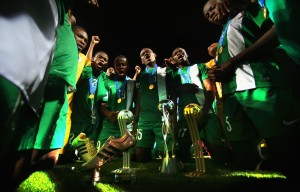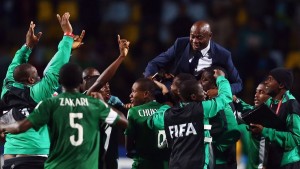Global Relevance Anyone? First, Build Your Local Strength.
The Golden Eaglets are by far the most successful team at this age grade. Nigeria has also come close to winning the U-20 World cup twice (1989 and 2005). Nigeria boasts of the first African Gold Medal in Olympic Soccer and we all know Nigeria’s pedigree in African soccer. The question that has been on the mind of soccer enthusiast is why the country has not been able to translate the overwhelming dominance in the age grade categories, especially the U-17 to global dominance in the senior competition?
I started with the achievement of the Golden Eaglets not as a means of regurgitating history but to lay a premise to the real reason for this post. This post is not just relevant to soccer but to almost every sphere of our lives as Africans. It was not a secret that before the MRI scan directives by FIFA; most African teams fielded extremely over-aged players for the age grade competitions. This phenomenon has greatly reduced after the introduction of the MRI scans in 2009. Nigeria lost most of the original team presented for the U-17 world cup but still finished in second place with a last minute selection.
The ability to catch age cheats means that the talented youngsters that represented us in 2013 and 2015 should give us a real hope of becoming competitive in the nearest future but this is not automatic. There are more important factors that will keep Europe and South America ahead of Nigeria and other African countries in terms of soccer and other human endeavors. And note that it really has nothing to do with age cheating anymore.
Below are the reasons we will still not perform well on the real global stage even with these talented youngsters from Nigeria, Mali and other African countries.
1. Lack of Solid Local Leagues: Talent is never enough! Every nation or organisation must have a structure that nourishes its talents, else they will fizzle out. African countries still struggle to have good soccer leagues and the soccer teams do not have the resources to have quality youth academies. U-17 Players from Spain, Germany, Brazil etc will go back to academies in Barcelona, Bayern Munich, Corinthians etc with world class training facilities and mindset. This is simply missing for African youngsters. The lucky few are the Iheanachos that are able to get European contracts immediately after a world cup. I believe Nwakali and Osimhen would have the same tale. But we need at least 80% of the team, if not more having such opportunities. These opportunities are better structured to be in their homeland as we cannot expect all of them to get foreign placements. Some of the youngsters receive bad counsel and move to some dingy countries where their careers die prematurely.
2. Dearth of Long-Term Thinking: It might be very impractical to groom all members of the present U-17 team to automatically represent Nigeria in U-21 competitions but we need to have as many of them as possible and retain the cohesion. Sometimes, the coaches are under pressure to either use federal character or even get players imposed on them. Our long-term thinking has to come into play here, having Nigeria at the top of our mind and not what individuals can gain. If our best 11 are all from one tribe, so be it.
3. Technical Deficiencies: As the European players get exposed to world class coaches, they become better. There have been very talented Nigerian and African sides in the senior world cup that lost in the knockout stages due to glaring technical deficiencies. A good case would be Nigeria Vs Italy in 1994 and recently, Ghana Vs Uruguay in 2010. Africans must keep sending their coaches to the best schools, getting accredited at the highest levels. Emmanuel Amuneke is on the right track and must be encouraged to keep going for these courses. Same with all coaches at every level.4. The National Association Conundrum: Without a vibrant and committed football association; most of the policy directions that should lead to success will not fly. A competent FA is not a political tool. It should have a fair representation of people with real football love and knowledge and who are devoid of making any political statements. The raw love of soccer must be evident. When these kind of people are running the FA, emotions would not be ruling our football but competent judgments for progressive policies.
5. Poor Economies: When I was growing up in Ibadan Nigeria, my dad used to take me to the stadium to watch our darling Shooting Stars football club known as IICC back in the days. It was a weekly ritual until the economy nosedived and we had better use for the money. The football problem in a place like Nigeria is a systemic one, which is linked to the core of the problems we face as a nation. We can try and revive the leagues, but if the economy is moribund, there is not much that would change. If our governments are indeed willing to rule the world in Soccer, they better know that it is also a function of the economy even if they want to deny the fact.
Remove the word soccer and related words from this article and you would realize that this is relevant to our non-competitiveness in Education, Health, etc. There are times students who struggled in Nigerian Universities traveled abroad and started blossoming in a sane academic environment. But not all Nigerian students can have that chance. Until our own Universities start matching the infrastructure, faculty quality and environment in the top universities – we will never catch up. For us to become globally competitive, we must first fix our local situations.

